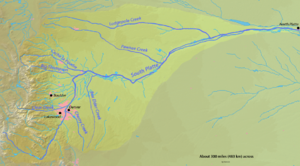
Map of the South Platte River watershed in Colorado and Nebraska in the central USA (Photo credit: Wikipedia)
Conflict between groundwater and surface water users on the South Platte River has been a concern in Colorado. At issue currently is whether the strict augmentation of water supplies now required of those who use wells is actually over-augmenting the alluvial aquifer, causing damage from high water tables.
The Colorado Water Institute at Colorado State University is studying the issue under the direction of the state legislature. Members of the CWI study team will meet with stakeholders and the public in Longmont, Sterling and Gilcrest, Colo., in January to inform people about the study and to facilitate dialogue about the issues.
Earlier this year, Colorado House Bill 12-1278 was passed, authorizing the first comprehensive study since the landmark study of 1968 that preceded the “Water Right Determination and Administration Act of 1969.” That act was Colorado’s attempt to bring groundwater under the same prior appropriation system as surface water rights.
“It’s time for the state to evaluate the relative success of augmentation plans authorized by the 1969 Act to meet the dual goals of protecting senior surface water diverters and maximizing the use of both groundwater and surface waters of the state,” said Rep. Randy Fischer, one of the bill’s sponsors.
CSU’s work collecting and analyzing available data is intended to bring objectivity to this polarizing issue. Results are due to the state legislature in December 2013. Reagan Waskom, CWI director and head of the study, said that his study team hopes to raise the level of conversation from contentious debate to respectful dialogue—an important role of a land-grant university.
“Gov. Hickenlooper recently touted Colorado as a state where the high altitude gives us the ability to tackle our problems through creative collaboration. We are going to take him up on the challenge,” said Waskom.
Joe Frank and Robert Sakata, two state water leaders often seen to be on opposite sides of the issue, have agreed to engage in a facilitated-dialogue about the topic as part of the January community meetings.
The meetings are free and open to the public. The format for all three meetings will be the same. They will be held from 1 – 3:30 p.m. Jan. 8 at the Southwest Weld County Building, 4209 Weld County Rd 24 in Longmont; 6 – 8:30 p.m. Jan. 14 at the Hays Student Center Ballroom, Northeast Junior College, 100 College Avenue in Sterling; and 6 – 8:30 p.m. Jan. 24 at Valley High School, 1001 Birch Street in Gilcrest.
For more information about the community meetings and about the study, visit http://www.cwi.colostate.edu/southplatte/index.html.

 Print
Print